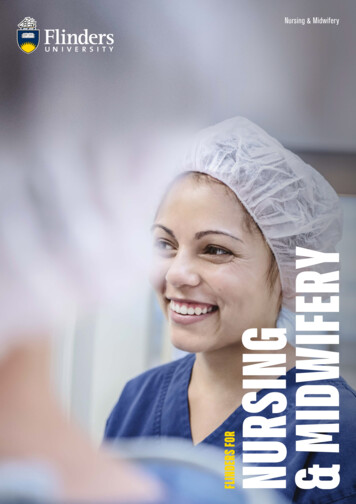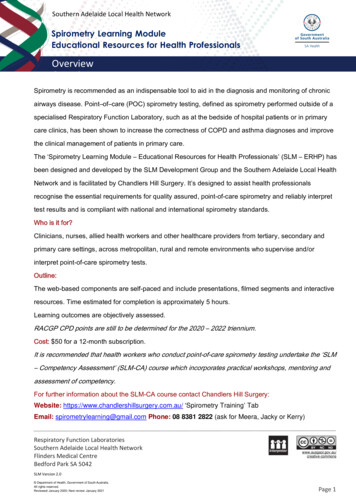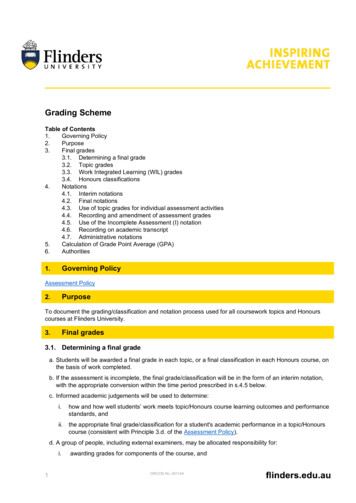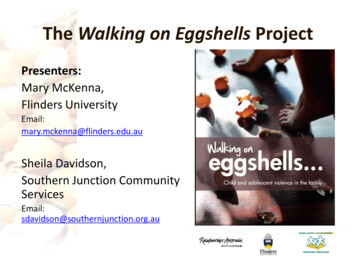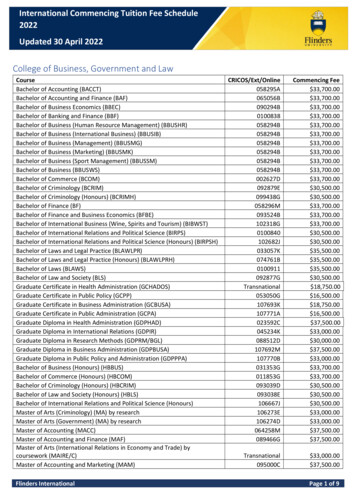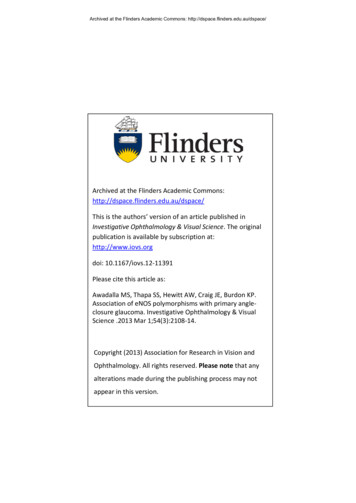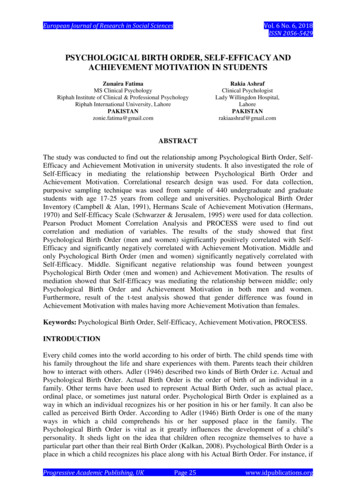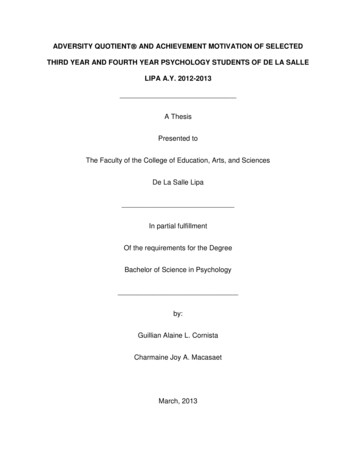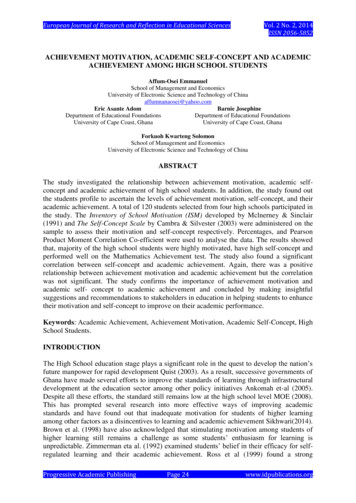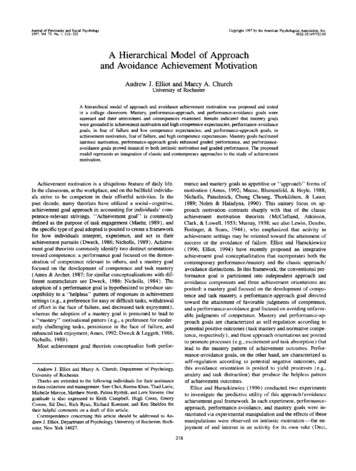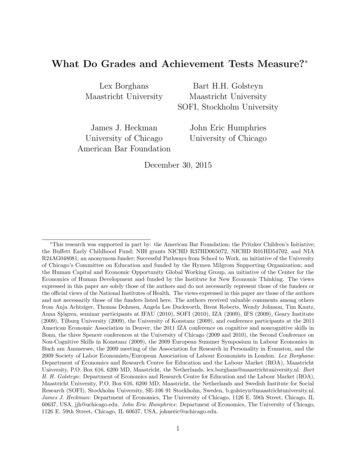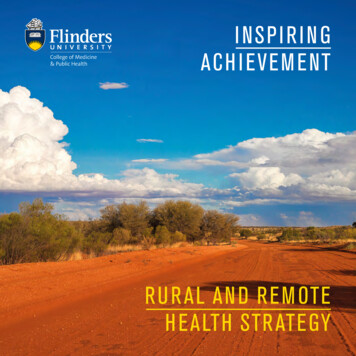
Transcription
College of Medicine& Public HealthI NSPI RI N GACH I EVEM ENTRU R AL AN D REM OTEH EALTH STR ATEGY
OUR LOCATIONSWELCO M EFirstly, I want to acknowledge the traditional owners of thelands on which Flinders University teaches, researchesand operates across (Arrernte, Boandik, Dagoman,Erawirung, Jawoyn, Kaurna, Larrakia, Ngarrindjeri, Ngadjuri,Peramangk, Ramindjeri, Waramungu, Wardaman andYolngu) and honour their Elders past and present.In my roles, I have had the immense pleasure andprivilege of meeting and working with staff, studentsand communities across our many locations in theNorthern Territory and South Australia. I have witnessedthe excellence, passion and commitment of our ruraland remote staff, the close connections that FlindersUniversity has with communities, and the positive affectsthat the contributions of our staff and students have onthe communities we serve.Ti-TreeFlinders University operates throughout the Central Australian Corridorand Nhulunbuy, bringing with them unique perspectivesand varied experiences but in a spirit of sharing that wasas unique as the location.In the lead-up to the retreat, we established four WorkingGroups to develop specific priority areas for discussion.The priority areas guided discussions and presentationswhich in turn provided the content for this Strategy. It is aliving and dynamic document, which provides a clear visionof where we want to be in five years’ time.I sincerely thank the members of each Working Group andthe Co-Chairs who led these groups during 2019 and, ofcourse, each participant at our Retreat, including thosefrom the College of Nursing and Health Sciences and theCollege of Education, Psychology and Social Work, andrepresentatives from many portfolios.This breadth of excellence, passion and commitment wascondensed into a single place in June 2019 when our Ruraland Remote Health Strategy Retreat brought togetherover 100 of our staff in Alice Springs to develop a sharedstrategy for the Discipline of Rural and Remote Health.At Flinders University we are in a truly privileged position tomake a difference in the communities we serve, and I lookforward to what we can continue to achieve, together.This Retreat remains a highlight: it was the first time thatmany of us have gathered in one place to have focusseddiscussions on rural and remote health. Equally asimportantly, the personal bonds, friendships and sharedexperiences that the Retreat facilitated are enduring.Staff travelled from places as diverse as Mt Gambier,Victor Harbor, Bedford Park, Renmark, Burra, DarwinProfessor Jonathan CraigInterim Dean, Rural and Remote HealthVice-President and Executive DeanCollege of Medicine and Public Health
I NTRO D U CTI O NFLINDERS UNIVERSITY IS RECOGNISED FORMAKING A DIFFERENCE LOCALLY AND GLOBALLYIN RURAL AND REMOTE HEALTH.Our education and research aims to equip the nextgeneration of leaders and innovators with the skill,commitment and vision to protect vulnerable communitiesand advance health outcomes. Our fundamental visionis to improve the health of our communities throughthe transformative power of education, research andhealth care.As well as delivering the Flinders NT Medical Program(NTMP), Flinders NT provides student placement andworkforce capacity support through the Remote andRural Interprofessional Placement Learning (RIPPL),manages the Centre for Remote Health, and the FlindersNT Regional Training Hub, focussed on the rural medicaltraining pipeline.Our geographic footprint throughout the Central AustralianCorridor is a defining feature for Flinders, and allowsus to deliver regional academic programs and researchthat impact some of the most under-served communitiesin Australia. Our focus on Aboriginal and Torres StraitIslander Health, rural and remote health issues and thedevelopment of a ‘home-grown’ health care workforcewithin rural and remote communities is a clear strength.Flinders University Rural Health SA facilitates high qualitymultidisciplinary health education and research acrossrural communities in South Australia including the ParallelRural Community Curriculum (PRCC) program, and theRural Junior Doctor Program. Our presence includes sitesin the Barossa Valley, Hills Mallee Fleurieu and KangarooIsland, Mid North and Yorke Peninsula, the Riverland,South East and Far North and Eyre Peninsula.The College has an extensive presence acrossthe Northern Territory, including Darwin, Nhulunbuy,Katherine, Tennant Creek and Alice Springs.In 2018, the College of Medicine and Public HealthStrategy was released, and articulates our focus onstrengthening College efforts across a range of prioritiesand positioning our people to enable even greaterexcellence and impact.The establishment of the Discipline of Rural and RemoteHealth (encompassing Flinders NT and Flinders RuralHealth SA) aims to achieve a more integrated approachto education and research in rural and remote health.Our vision is to be recognised as the global leader in ruraland remote health research, and as a global leader in thedevelopment of a committed and highly skilled rural andremote health workforce.In order to achieve this vision, we must continue to fosterpartnerships with local health, community and governmentagencies and support research opportunities on healthmatters relevant to local communities. Flinders mustposition itself to leverage investment in rural, regional andremote Australia to provide more choice and access forregional students pursuing higher education.Our four priority areas of focus are identified in Part Oneof this document: Aboriginal and Torres Strait Islander health Education Research Partnerships.Part Two outlines specific activities and plans to deliveron our priorities.Attendees at the 2019 Rural and Remote Health Strategy Retreat in Alice Springs
PART O N EO U R PRI O RITI ESABO RI G I NAL AN D TO RRESSTR AIT ISL AN D ER H EALTHFlinders University recognises the unique position ofAboriginal and Torres Strait Islander Australians as FirstNations people, and is committed to Aboriginal and TorresStrait Islander education and engagement. The Universityis currently developing a Reconciliation Action Plan forsubmission to Reconciliation Australia.We recognise the unique place of Aboriginal and TorresStrait Islander people in Australia, and the resilienceand cultural diversity within Aboriginal and Torres StraitIslander Australia. We know that connection to cultureand connection to cultural understandings is veryimportant in maintaining wellbeing. We also note thehealth disadvantages that many Aboriginal and TorresStrait Islander people experience today.As a College and University, we will act to ensurestaff, students, and those with whom we collaborate,comprehend both the needs and the strengths withinAboriginal and Torres Strait Islander Australia. Thesestrengths provide the foundation as we reframe thehealth narrative to privilege and centre Aboriginalpeoples’ ongoing connection to country, and the needto practice and uphold Aboriginal Lore/Law and culture.As a College, we will respond to those local priorities inconsultation and partnership with Aboriginal organisationsand communities acknowledging our global responsibilityas First Nations citizens.
ED U CATI O NSTUDENT EXPERIENCEA model that prioritises community need, while privilegingmeaningful rural and remote immersion and communityengagement for health professions students, will bedeveloped.RURAL AND REMOTEHEALTH CURRICULUMThe development of a rural and remote health curriculumwill provide the framework to educate students abouthealth and health-system related issues in rural and remotecontexts, and equip and prepare students for rural andremote learning placements. A curriculum will improvestudent preparedness for work integrated learning in ruraland remote contexts, and emphasise inter-professionaland collaborative health care teams.RURAL EDUCATIONAL PIPELINEDeveloping a rural educational pipeline of learningopportunities will provide greater opportunities for rural andremote students and increase the number of ‘home grown’health professions students at Flinders, and ultimatelyworking in their communities. We aim to increase enrolmentand graduation of rural and remote students at Flinders,and increase outreach and support to rural and remoteorigin students in schools early to develop and nurturepathways into health professions careers.RESEARCHPARTNERING WITH THE RURALAND REMOTE WORKFORCEBUILDING A RURAL AND REMOTE HEALTHCOLLABORATIVE RESEARCH NETWORKCOMMUNICATING AND CELEBRATINGRURAL AND REMOTE HEALTH RESEARCHBuilding educational capacity in rural and remotecommunities and with the local workforce will enhancestudent learning opportunities and experiences inrural and remote areas. There is significant unrealisedopportunity to develop innovative short course offeringsand professional development offerings that meet localcommunity and workforce requirements that can supportlifelong learning. Online learning platforms and innovativestrategies to increase access to educational programs arerequired to ensure educational offerings in rural and remoteareas are valued equally. Flinders has an opportunity toposition itself as the key partner for education in ruraland remote communities.We will lead the establishment of a cross-College rural andremote collaborative health research network within theFlinders Health and Medical Research Institute (FHMRI).Communicating our strategy and activities to support anddevelop rural and remote health research at Flinders iscritical. Mechanisms to enable staff to access opportunitiesfor development and to network are important and requirecreative solutions to enable appropriate access and moreflexible opportunities given the challenges of geography.EDUCATIONAL INFRASTRUCTUREDEVELOPING RESEARCH CAPACITYSupporting innovation in learning and teaching in ruraland remote health, and the development of educationalinfrastructure is critical to the success of our graduates,their experience as a Flinders student, and to the reputationof Flinders as an educational institution and partner in ruraland remote communities.Strengthening research capacity across rural and remoteAustralia will involve supporting and mentoring early andmid-career researchers, increased higher degree researchstudents in the rural and remote health context, andattracting high quality researchers and collaborators.DEVELOPING RESEARCH PRIORITIESRural and remote health research priorities will continueto evolve, but will retain a clear focus on understanding thecharacteristics that are important to the effectiveness andsustainability of health services and the health workforceacross the Flinders footprint, and rural/remote trainingstrategies, with particular attention to the Aboriginal andTorres Strait Islander health workforce.RESEARCH PARTNERSHIPSDeveloping strong and effective partnerships withinFlinders, with other universities, research institutes, healthservices and policy makers will ensure our input and impactin policy and practice.
Flinders staff from rural and remote locationsPARTN ERSH I PSFlinders University operates in rural and remote communitycontexts that are geographically and culturally diverse. Ourcommunities are unique and engagement is fundamental tosuccess in achieving our education and research goals.Strong and effective partnerships contribute to buildinglocal communities, in particular the future health workforce,and ensure that local knowledge is incorporated intoour activities. Partnerships are fundamental to educatingour students and in ensuring graduate outcomes meetcommunity needs.Partnerships are critical to our success, and in ensuringmeaningful engagement with our communities in thedelivery of our vision and activities. The translation of thegoals of our programs into successful outcomes requiresan appreciation of our stakeholder’s needs and priorities.Flinders needs to ensure that our process of engagementand collaboration with partners is transparent, consultative,values-based and responsive to feedback. We will developa recommended approach to establishing and maintainingpartnerships, and inform a policy approach to partnershipsthat can be positioned at the heart of all Universityrelationships in rural and remote contexts. Ultimately,our communities will expect and recognise Flinders as aconsultative and respectful partner in our business.
PART TWOO U R PL ANSABO RI G I NAL AN D TO RRESSTR AIT ISL AN D ER H EALTH We will ensure all our College activities reflect ourrecognition of Aboriginal and Torres Strait Islanderpeoples as traditional owners and custodians of thelands on which we work, and the Aboriginal and TorresStrait Islander knowledge and value systems that informthat work. We will recruit and nurture new and existing Aboriginaland Torres Strait Islander academic and professionalstaff to grow our teaching and research capabilities anddevelop academic and professional leaders. We will ensure our curricula develop culturally-safegraduates equipped to work effectively with Aboriginaland Torres Strait Islander people. We will further develop our modes of communityengagement to ensure comprehensive participationin, and representation of community perspectivesinto, Aboriginal and Torres Strait Islander matters ofrelevance to our College. We will deliver on strategies to increase Aboriginaland Torres Strait Islander student enrolments, retention,successful graduation and identified pathways toemployment. We will support Aboriginal and Torres Strait Islanderstudent success through integrated and tailored support,appropriate entry and course pathways, culturally-safecurricula and pedagogy, and the fostering of a culturallysafe College environment.Centre for Remote Health, Alice Springs We will consult to ensure our research reflectscommunity priorities, as well as developing bothAboriginal and Torres Strait Islander and nonAboriginal and Torres Strait Islander researcher capacityto successfully conduct research in areas that enhancethe health and well-being of Aboriginal and Torres StraitIslanders.Flinders staff from rural and remote locations
ED U CATI O NSTUDENT EXPERIENCE We will expand longitudinal placements in rural andremote settings.RURAL AND REMOTEHEALTH CURRICULUM We will develop an inter-professional education programto assist the development of collaborative practice skills,suited to rural and remote settings. We will develop a rural and remote health vision acrossthe University, by establishing a cross-College Ruraland Remote Education Committee and developing acollaborative governance framework. We will undertake a scoping project to explore localcapacity to increase student numbers and maximise thematching of students to local learning environments. We will develop and deliver a rural and remote healthcurriculum, to align learning in a common contextualframework, to be utilized and adapted across Colleges. We will work towards greater community and local healthworkforce engagement to underpin meaningful studentexperiences, and develop local young professional’snetworks to support placement of students and newlyarrived health professionals. We will identify existing rural and remote health andIndigenous health topics and course content and mapstaff and resources involved. We will develop integrated health and wellbeing supportfor student success. We will create stand-alone course content in additionto expansion topics, preparatory courses and bridgingprograms to add to existing discipline specificcurriculum. We will work with the Centre for Innovation in Learningand Teaching (CILT) to design and deliver innovative ruraland remote health curriculum. We will build infrastructure capacity to deliver a flexibleand accessible rural and remote health curriculum.RURAL EDUCATIONAL PIPELINE We will develop strategies to identify rural and remoteoriginal students earlier in their admissions journey. We will explore specific rural and remote studententry pathways into health professions courses acrossthe University and consider marketing and branding ofpathways and courses. We will expand targeted school engagement strategiesin rural and remote towns and communities, includingon-campus residential programs for high schoolstudents. We will develop pathways from school to university thatmaximise educational opportunities for students. We will develop targeted strategies that maximisesupport for rural and remote students, particularly duringtheir first year at university. We will investigate partnerships and course offeringsthat enable education programs to be offered locally andengage with regional health and education providers, aswell as greater online education opportunities.PARTNERING WITH THE RURALAND REMOTE WORKFORCE We will undertake an assessment of the opportunities,and current gaps in support in education capacity. We will build the profile of postgraduate courses thatpromote rural, remote and Aboriginal and Torres StraitIslander practice for health professions, which areinformed by community needs. We will develop a strategy to further engage the ruraland remote health workforce, incorporating awardingacademic status, and placement supervisor awards. We will identify existing short courses and professionaldevelopment opportunities. We will develop a support framework to guide theexpansion and marketing of existing activities anddevelopment and implementation of new activities. We will further develop interprofessional capabilitiesacross disciplines. We will further expand and enhance simulation teachingtechnology and support from the Bedford Park campus.
RESEARCHEDUCATIONAL INFRASTRUCTURE We will adopt principles to maximise educationalinfrastructure and investment in rural and remote sites. We will scope the expansion of the learning coachmodel to maximise student learning opportunities.BUILDING A RURAL AND REMOTE HEALTHCOLLABORATIVE RESEARCH NETWORK We will create spaces and places for students tosocialise together, share experiences and learn fromeach other in a supported environment. We will map current research, key academic staff,existing strengths and weaknesses to enable anapproach that can build on current research strengthsthroughout the Corridor, and identify opportunitiesfor development. Existing strengths include workforceresearch, healthy ageing, mental health, socialdeterminants of health, and methodological expertise inepidemiology, program evaluation and systematicreviews. We will partner with CILT to support innovation inlearning and teaching and maximise creative learningopportunities. We will further the development and expansion ofsimulation teaching environments.Discussions at the 2019 Rural and Remote Health Strategy Retreatin Alice Springs We will host a Rural and Remote Health ResearchSummit to bring together relevant internal and externalstakeholders. We will establish a Rural and Remote Health ResearchSteering Committee to scope new concepts for buildingand supporting research excellence. We will establish research themes of excellence relevantto rural and remote health and target strategicappointment of research academics to support the ruraland remote health research agenda.DEVELOPING RESEARCH PRIORITIES We will conduct data-linkage and population healthstudies to better understand health outcomes in ruraland remote communities, in key focus areas such asmental health and emotional wellbeing, rural and remotehealth workforce, ageing and primary care. We will conduct translational research to improvehealth outcomes for rural and remote communities, andto influence policy and practice. We will develop methodological expertise in communityengaged research, action research, systematic reviewand population health research. We will develop workshops with local Aboriginal andTorres Strait Islander people in communities to listen andhear local voices on research priorities. We will undertake research that helps us describe andunderstand important aspects of primary health care andworkforce in rural and remote Australia, including gaps inservice delivery, workforce skill and composition,retention and turnover.
DEVELOPING RESEARCH CAPACITYRESEARCH PARTNERSHIPS We will target strategic appointments of high calibreresearch academics, including Aboriginal and TorresStrait Islander health researchers. We will strengthen our research relationships andcollaborations with other Colleges, and link in withexisting research institutes, including the CaringFutures Institute, and Orama. We will establish research themes of excellence with afocus on attracting PhD and Masters students to Flinders. We will ensure seamless access to all research trainingfor rural and remote academics, including developmentand support for NHMRC, ARC and MRFF grantopportunities. We will position seed funding to support new andinnovative research ideas in rural and remote teams. We will build the capacity of medical and allied healthclinicians across the Corridor to conduct and contributeto purposeful research, support Advanced Studies andhigher degree research students. We will establish a monthly journal club and webinarprogram as part of the rural and remote collaborativehealth research network. We will develop and maintain partnerships with LocalHealth Networks (LHNs), Primary Health Networks(PHNs), non-government organisations, general practiceorganisations and local community organisations. We will scope and undertake new collaborative researchprojects consistent with strategic priorities set by therural and remote health collaborative research network.PARTN ERSH I PS We will develop a core principles statement to outlinethe important elements underpinning partnerships in therural and remote context. We will develop a transparent protocol and guidelinesfor developing and maintaining partnerships in rural andremote communities. We will grow strategic research partnerships with leadingnational and international peers in fields where we seekto build the rural and remote health research profile.COMMUNICATING AND CELEBRATINGRURAL AND REMOTE HEALTH RESEARCH We will develop a communication strategy for ruraland remote health research at Flinders to promotecommunications throughout the Corridor, and BedfordPark; incorporating a rural and remote research emailgroup, an annual research retreat and forum series,plus webinar and journal club opportunities for staffand students. We will develop a web presence and virtual structureor rural and remote health research. We will conduct a rural and remote health forum inAdelaide to communicate to a wider audience. We will engage regional community coalitions indeveloping the agenda for community research priorities.Attendees at the 2019 Flinders Rural Health SA Awards We will design a communication and marketing strategyto ensure the protocol and guidelines are relevant for ourpartnerships and ensure collective understanding acrossthe University about its purpose and use.
ers University 2020. CRICOS Provider: 00114A
in the Barossa Valley, Hills Mallee Fleurieu and Kangaroo Island, Mid North and Yorke Peninsula, the Riverland, South East and Far North and Eyre Peninsula. In 2018, the College of Medicine and Public Health Strategy was released, and articulates our focus on strengthening College efforts across a range of priorities
